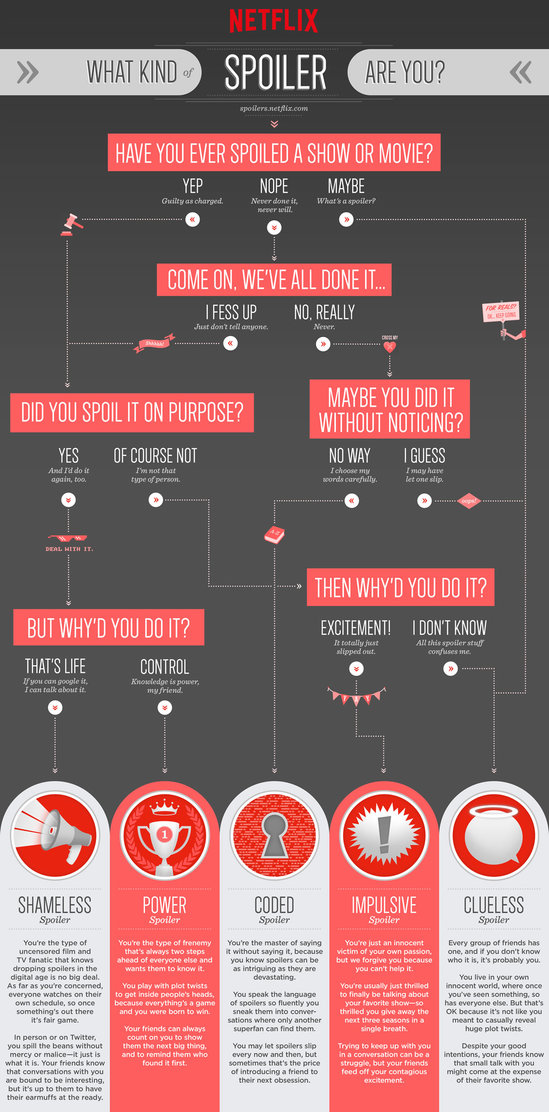Netflix Research Reveals Our Depraved Love of Spoilers; Americans’ Inability to Shut Their Pie Holes
Loose lips ruin ships.

My fellow Americans, it is time to ‘fess up. According to new Netflix research, there’s a spoiler epidemic in our country, and nearly all of us are guilty of prematurely revealing an important plot point to someone else. So why can’t we keep our Yank mouths shut?
Grant McCracken, a Cultural Anthropologist recently hired by the streaming service to study audiences’ experience in the digital age, says that spoiling a show or movie for someone else is just a bid for social power. The Harvard Business School Professor explained to The New York Times that viewing a show in the 2014 works almost like time travel, with audiences communicating (and spoiling!) from across the world via the Internet: “I live in the future that you are about to occupy…[therefore, I] have power.” Netflix has compiled this flowchart to help users determine which of McCracken’s five different “Categories of Spoilers” they fall into:
Netflix has also turned McCracken’s data into the fun Q&A site “Living with Spoilers,” an interactive tool designed to “help the streaming service understand the changing nature of television in society”—and let users procrastinate indefinitely. The addictive site has a “what kind of spoiler are you” quiz (I’m clueless. Yay?), lets users vote on which spoilers should be in the public domain, and comes equipped with a dangerous “Spoil Yourself” button.
Interestingly, research conducted by YouGov and Harris Pol on behalf of Netflix indicates that Americans’ fairly laissez-spoil attitude may be unique—52% of Brits that responded to the poll said they felt guilty for sharing spoilers, compared to a mere 37% of U.S. participants. Using questionnaire responses from 2,421 respondents in the UK, and 2,023 in the US, Netflix found that 76% of American participants believe spoilers are an inevitable part of modern life, compared to 24% of Brits. British respondents also claim to have immense respect for their fellow audience members—82% of participants said they had never “cheated” and jumped ahead on a show they were watching with someone else.
Ted Sarandos, Netflix’s chief content officer, says the stigma surrounding spoilers will continue to change and reflect the evolving ways in which content is distributed:
When we premiered all episodes of our shows like House of Cards and Orange Is the New Black all at once, across the world, it created a new dynamic around spoilers, even here in the UK.
Without spoiling too much for each other in the comments below, does any of Netflix’s research ring true to you? Have you accepted spoilers as an inevitable downside to the instant gratification of our modern times, or will you ruin anyone who rains on your Castamere parade? As someone who didn’t know her Keyser Sözes from her Malcolm Crowes until shamefully recently, I’m probably the latter. But the times are a changin’.
- Clever animation lampoons spoilers and fandoms
- TiVo survey says your friends and coworkers are most likely to spoil you
- Are there rules for spoilers? Should there be?
(via Pajiba, Laughing Squid, Digital Spy)
Are you following The Mary Sue on Twitter, Facebook, Tumblr, Pinterest, & Google +?
Have a tip we should know? tips@themarysue.com